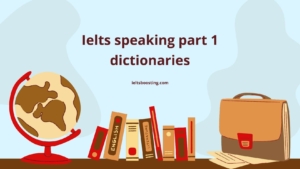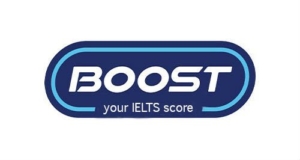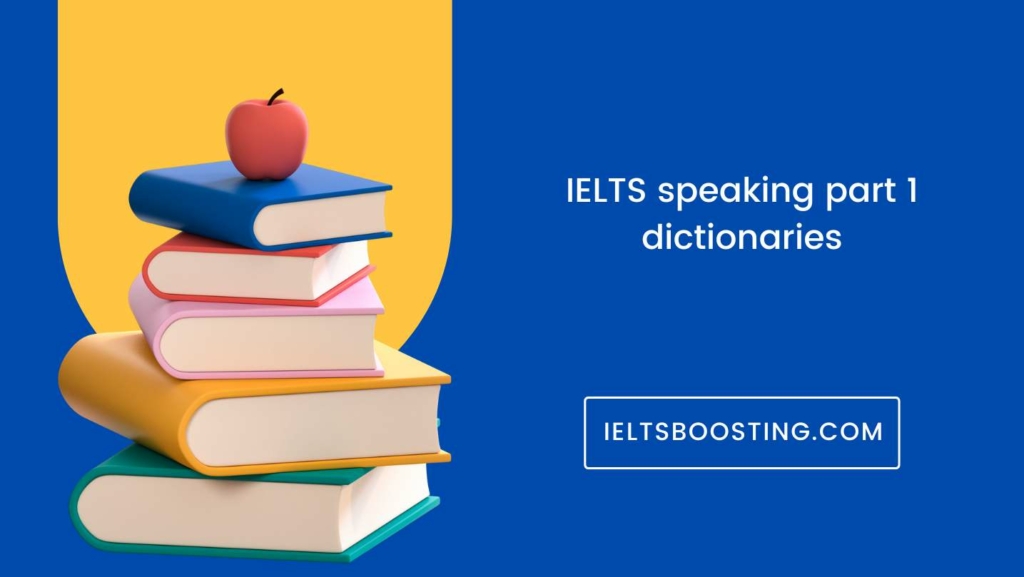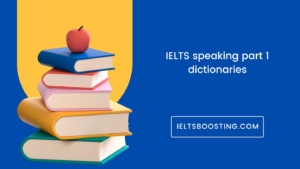IELTS speaking part 1 dictionaries
Have you ever used a dictionary?
Do you prefer paper or electronic dictionaries?
I’m quite torn between paper and electronic dictionaries, to be honest. The convenience of an electronic dictionary on my phone is unbeatable, especially when I’m on the go. However, there’s a certain charm to leafing through a paper dictionary, feeling the pages, and stumbling upon new words. So, while I lean towards electronic for practicality, I hold a special fondness for the traditional paper ones.”
Useful Vocabulary:
- Torn: Unable to decide between two choices.
- Convenience: The state of being able to do something easily or without much effort.
- Electronic Dictionary: A digital version of a dictionary, often accessible on electronic devices.
- On the go: Busy and active; moving about.
- Charm: A quality that is pleasing or attractive.
- Leafing Through: Turning over the pages of a book.
- Stumbling Upon: Finding something unexpectedly.
- Lean Towards: To show a preference for something.
- Practicality: The quality of being sensible and realistic.
- Special Fondness: A particular liking or affection for something.
- Traditional: Established; long-standing.
Sample 2
“I definitely have a preference for electronic dictionaries. The sheer convenience of having a whole library of words at my fingertips is just brilliant. Plus, the search function on electronic versions makes finding definitions so much quicker. It’s all about efficiency for me, and electronic dictionaries fit the bill perfectly.”
Useful Vocabulary:
- Definitely: Without doubt; clearly.
- Preference: A greater liking for one alternative over others.
- Sheer Convenience: The complete ease and absence of difficulty.
- Library of Words: A large collection of words and their meanings.
- Fingertips: The end of one’s fingers, symbolizing immediate access.
- Brilliant: Excellent; outstanding.
- Search Function: A feature that allows users to look for specific information.
- Finding Definitions: The act of looking up the meanings of words.
- Quicker: Faster; taking less time.
- Efficiency: The ability to accomplish something with the least waste of time and effort.
- Fit the Bill: To be suitable for a particular purpose.

Ielts speaking part 1 dictionaries
Are dictionaries used a lot in your foreign language classes?
In our foreign language classes, dictionaries are absolutely essential. They’re used constantly, whether it’s for looking up new words or understanding complex phrases. We’re encouraged to use them not just in class but also as part of our homework. It really helps in getting a deeper understanding of the language we’re learning.”
Useful Vocabulary:
- Essential: Absolutely necessary; extremely important.
- Constantly: Continuously over a period of time; always.
- Looking Up: Searching for or finding information in a reference book or database.
- Complex Phrases: Groups of words with a complicated or intricate meaning.
- Encouraged: Given support, confidence, or hope to do something.
- Homework: Schoolwork that a student is required to do at home.
- Deeper Understanding: A more thorough or comprehensive comprehension.
- Foreign Language: A language not native to the speaker’s country.
Do you think dictionaries are useful?
Absolutely, I think dictionaries are incredibly useful. They’re like a treasure trove for anyone learning a new language or expanding their vocabulary. Whenever I come across a word I don’t know, I turn to a dictionary for a clear explanation. It’s not just about meanings; they also provide pronunciation, usage, and sometimes even historical context.
Useful Vocabulary:
- Incredibly Useful: Extremely helpful or beneficial.
- Treasure Trove: A valuable or abundant source.
- Expanding Vocabulary: Increasing the number of words a person knows.
- Come Across: To find or encounter, especially by chance.
- Clear Explanation: An easy-to-understand description or clarification.
- Pronunciation: The way in which a word is pronounced.
- Usage: The manner or way in which something is used.
- Historical Context: The background that helps to understand the time and circumstances in which something was created or established.



